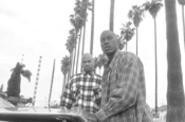This glitch is unfortunate, because in most other ways, Baby Boy is the smartest and most sensitive movie of Singleton's career. A cut-and-paste pastiche of material lifted wholesale from his Boyz N the Hood and Poetic Justice, this feature embarks on new frontiers within his beloved South Central. The boyz are still here, and they're still bangin' and all . . . er . . . dat, but the director's ripening sensibilities are proving fruitful in unexpected ways. With the possible exception of his overwrought but well-intentioned Rosewood, Baby Boy is Singleton's first project to present itself not just as a black movie, but as a truly American movie, revealing our unique domestic screw-ups.
Our focal point here is Jody (Tyrese Gibson), whom we first encounter fully grown yet fetal, naked within the confines of a massive, watery womb. The symbolism isn't the subtlest (nor is it intended to be), but the message works, as we are informed that the black man has been made to think of himself as a baby, calling his woman "Mama," his friends "boys," and his home a "crib." While the underlying theme of black manhood isn't so different from that of Gary Hardwick's The Brothers earlier this year, the inescapable gravity of the hood -- in which drink and jail vie with death for young men's souls -- sets this project on its own distinctive turf.
To put it mildly, Jody has problems. Streetwise but jobless and directionless, he exists in a state of suburban complacency with his young single mother, Juanita (A.J. Johnson). He's only 20 years old, but already he's sired two kids with different women ("That's something I know how to do is make some pretty babies," he explains, by way of a résumé), and the juggling act is fast becoming a circus. While he makes clandestine visits to Peanut (Tamara Bass) and his baby daughter, Lil' Nut (Cleopatra Singleton), he also conjures the illusion that he's true to his main squeeze, Yvette (Taraji P. Henson), the mother of his toddler son, Joe Joe (Kylan Bolton/ Kaylan Bolton).
While Ice Cube had time to "philosophisize on God, church, bitches, 'n' all" in Boyz, and Maya Angelou added depth to Justice, Jody affords himself no such spiritual luxuries, guided as he is by the little fellah with the big attitude. Singleton makes assorted nods to (and swipes at) the "African booty-scratchers" of his first film, but here he's much more concerned with countless booty calls, following the horny but emotionally inept lad through assorted conquests, near-misses, and narrow escapes. The movie's outlandish candor and sex play may not be for everyone, but it all feels refreshingly real, especially when anger and ardor intertwine. Happily, not only are the actors truly game for the ride, the cutting by Bruce Cannon reaches an awesome orgasmic fervor.
Of course, when sex rears its head, there are going to be issues, and Jody finds himself stuck between rocking and a very hard place when his mother's new boyfriend, Melvin (Ving Rhames), comes to call (or vice versa). A scarcely reformed gangster who gladly distracts Juanita from her zealous gardening, Melvin is the nightmare Jody has been dreading: a thug with insatiable hots for mama, just like the previous one who wooed Juanita and convinced her to kick Jody's brother out of the nest and into the grave. While Jody struggles to chart a masculine course, he suddenly finds himself saddled with a violent bastard as a potential role model. Cruel, cruel fate.
Even though Singleton throws in a few of his characteristic caricatures for cheap laughs or gasps (a fag hairdresser here, a megaslut there), Baby Boy adeptly delivers his most intricate and delicate relationships to date. Above all, this is a movie about fatherhood and commitment, and while Jody's gradual acquiescence to Melvin's bludgeoning presence (and culinary nudity) stretches credibility far beyond its elastic limit, Singleton's doses of sap -- exacerbated by the heavyhanded guide track of composer David Arnold -- are not lethal. Yes, inexplicably, Melvin is let off the hook for his viciousness (mainly because Rhames totally owns the movie whenever he's onscreen), but supporting thugs such as Yvette's pugnacious ex-lover Rodney (Snoop Dogg) and Jody's friend Sweetpea (Omar Gooding) wallow in the bad and the ugly so much, one is forced to fill in the blank: "Hey guys, where's Dad?"
Because Singleton wants so badly to rid his hood of horror -- bless him for that -- it's easy to award points for nobility. Yet Baby Boy is really about baby steps -- mantras for success squeezed between fits of madness, boosters turned entrepreneurs, children becoming parents, and parents learning to play again. It's a feel-good movie that happens to have a lot of feel-bad in it.


